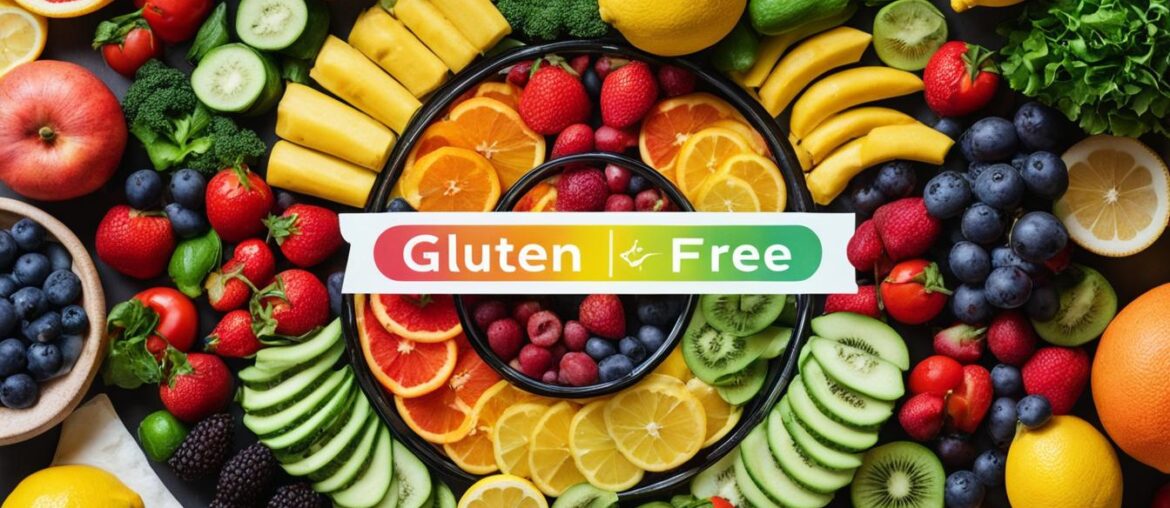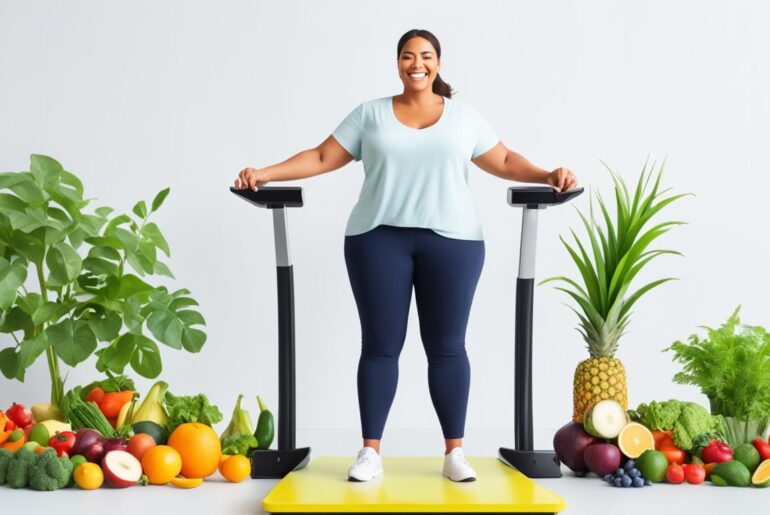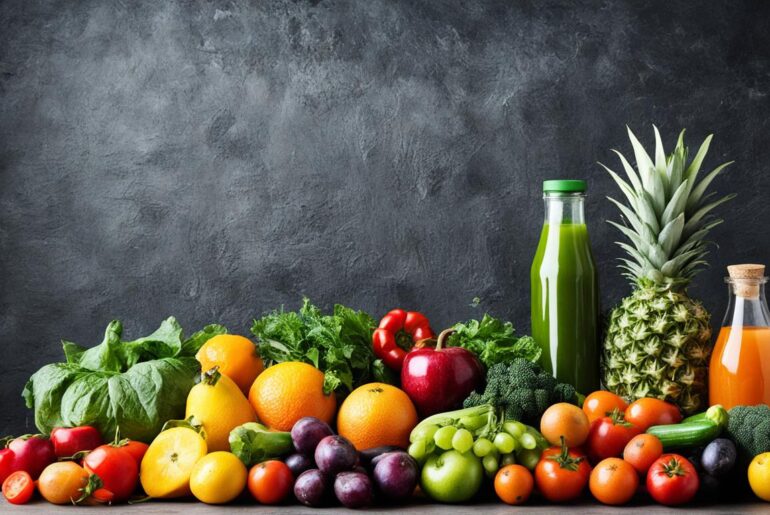Many people turn to a gluten-free diet as a way to lose weight. Celebrities have popularized the idea that eliminating gluten from your diet can lead to rapid weight loss. While some people may see positive results, the effectiveness of a gluten-free cleanse for weight loss is still debated among experts. It’s important to understand the potential benefits and drawbacks of this approach before incorporating it into your weight loss plan.
Key Takeaways:
- A gluten-free cleanse for weight loss is a popular approach, but its effectiveness is still questioned by experts.
- Eliminating gluten from your diet may restrict certain food options and potentially reduce overall calorie intake.
- The impact of a gluten-free diet on weight loss is inconclusive, and individual results may vary.
- Maximizing gluten-free weight loss efforts can be achieved through strategies such as calorie counting, choosing nutrient-dense foods, and incorporating regular physical activity.
- Potential pitfalls of a gluten-free diet for weight loss include nutritional deficiencies and reliance on processed foods.
Does a Gluten-Free Diet Aid Weight Loss?
The question of whether a gluten-free diet aids in weight loss is not easy to answer. Some nutritionists believe that eliminating gluten can lead to weight loss because it restricts the types of foods a person can eat, consequently reducing overall calorie intake. Others argue that gluten itself does not directly cause weight gain, but rather, it’s the high-calorie gluten-containing foods that contribute to weight gain.
The research on the impact of a gluten-free diet on weight loss is inconclusive, and individual results may vary.
| Pros of a Gluten-Free Diet for Weight Loss | Cons of a Gluten-Free Diet for Weight Loss |
|---|---|
|
|
When considering a gluten-free diet for weight loss, it is important to carefully evaluate the potential benefits and drawbacks. It’s always advisable to consult with a healthcare provider or nutritionist for personalized guidance and support.
Strategies for Maximizing Gluten-Free Weight Loss Efforts
If you are committed to trying a gluten-free cleanse for weight loss, there are several strategies you can implement to maximize your efforts.
- Counting calories: It is important to keep track of your calorie intake to ensure you are in a calorie deficit for weight loss. By monitoring your calorie intake, you can make informed decisions about portion sizes and food choices.
- Choosing whole, nutrient-dense foods: Opt for fruits, vegetables, and lean proteins that are gluten-free. These foods are not only satisfying but also provide essential nutrients to support your overall health.
- Incorporating regular physical activity: Exercise plays a crucial role in weight loss. By including regular physical activity in your routine, you can burn calories, build muscle, and boost your metabolism.
- Being mindful of portion sizes: Pay attention to portion sizes to avoid overeating. Even gluten-free foods can be high in calories, so it’s important to practice portion control.
- Avoiding gluten-free processed foods: While convenient, gluten-free processed foods can be calorie-dense and low in nutrients. Opt for whole foods whenever possible to support your weight loss goals.
Implementing these strategies can help you make the most of your gluten-free cleanse for weight loss. Remember to consult with a healthcare provider or nutritionist for personalized guidance and support.
Potential Pitfalls of a Gluten-Free Diet for Weight Loss

While a gluten-free diet can have benefits for those with celiac disease or gluten sensitivity, there are potential pitfalls when it comes to using it solely for weight loss. It’s important to be aware of these considerations before embarking on a gluten-free cleanse for weight loss.
Lack of Essential Nutrients in Gluten-Free Processed Foods
Gluten-free processed foods often lack essential nutrients like fiber, B vitamins, and minerals. These products are typically made with refined gluten-free grains, which have a lower nutritional value compared to whole grains. Without careful attention to balanced and nutrient-dense food choices, following a strict gluten-free diet can result in nutritional deficiencies, which may negatively impact overall health and well-being.
High-Calorie and High-Fat Gluten-Free Products
Many gluten-free products, such as bread, pasta, and baked goods, can be higher in calories and fat compared to their gluten-containing counterparts. This can be attributed to the need for alternative ingredients and different manufacturing processes. Consuming these products in excess can lead to weight gain, rather than weight loss. It’s essential to read food labels and choose gluten-free options that are lower in calorie and fat content.
“Consuming gluten-free processed foods that are higher in calories and fat can hinder weight loss efforts.”
When considering a gluten-free cleanse for weight loss, it’s important to focus on nutrient-dense whole foods. This includes fruits, vegetables, lean proteins, and gluten-free whole grains like quinoa, buckwheat, and brown rice. By incorporating these foods into your diet, you can ensure you are still getting all the necessary nutrients while following a gluten-free eating plan.
Additionally, it’s crucial to consult with a healthcare provider or registered dietitian before starting any restrictive diet or weight loss plan. They can provide personalized guidance and support to ensure you are meeting your nutritional needs while addressing any underlying health conditions.
Conclusion
In conclusion, the effectiveness of a gluten-free cleanse for weight loss is still debated among experts. While a gluten-free diet may be effective for weight loss in certain individuals, it is not a one-size-fits-all solution. The research on the impact of a gluten-free cleanse on weight loss is limited and conflicting. It’s important to consider the potential pitfalls of a gluten-free diet, such as nutrient deficiencies and reliance on processed foods.
While some people may see positive results from a gluten-free cleanse, it’s important to remember that weight loss is a complex process influenced by many factors. Balancing calorie intake, choosing nutrient-dense foods, and incorporating regular physical activity are key factors in successful weight loss. By focusing on these aspects, individuals can achieve weight loss goals regardless of whether they choose a gluten-free cleanse or not.
When considering a gluten-free cleanse for weight loss, consulting with a healthcare provider or nutritionist can provide personalized guidance and support. They can help assess individual needs, recommend appropriate dietary changes, and address any concerns or questions about the gluten-free diet. This professional guidance can be invaluable in achieving long-term weight loss success and maintaining overall health and well-being.




